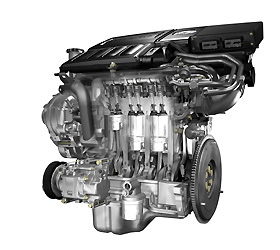|
Mazda Motor Corporation has developed all-new aluminum inline
four-cylinder engines with a displacement of 1.3L or 1.5L for
the new small car to be launched this summer.
The MZR1.3/1.5 engines are the second in Mazda's new generation engine
series "MZR" following the MZR 2.0/2.3 engines for the Atenza
and MPV. The completely redeveloped engines truly embody the spirit
of the brand message of Mazda known as "Zoom-Zoom" (the thrill
of motion that we felt in childhood).
Shigeo Mizuno (Powertrain Deputy Manager) in charge of development
of the engines said, "We brought our engineering and production
staff together to create the MZR1.3/1.5 engines to fully inject Mazda's
brand DNA into engine performance. We are confident that these small
car engines signal a new benchmark for the class."
The inline four-cylinder MZR1.3/1.5 engines have incorporated the four
following attributes to deliver Mazda's DNA characteristic responsive
performance and handling:
(1) Linear acceleration
(2) Lively response
(3) Strong torque response
(4) Attention to environmental concerns
While setting the same development goal as the MZR2.0/2.3, Mazda has incorporated
significant new technologies suitable for small car engines, including
a modular design (IAFEM: Integrated Air Fuel Electrical Module), that
combines intake manifold, air cleaner, PCM (Powertrain Control Module), etc.

Mazda MZR 1.3/1.5-Liter Engine (CAD image)
Engine specifications
| |
MZR1.3 (Type ZJ-VE ) |
MZR1.5 (Type ZY-VE) |
Displacement
|
1,348cc |
1,498cc |
| Maximum power (JIS net) |
67kW (91PS)/6,000rpm
|
83kW (113PS)/6,000rpm |
| Maximum torque (JIS net) |
124Nm (12.6kg-m)/3,500rpm |
140Nm (14.3kg-m)/4,000rpm |
Stronger torque in low to mid-ranges
Mazda's goal was to achieve a linear, lively, and stronger torque response
to reflect its brand message "Zoom-Zoom." Striving for this
goal, the MZR1.3/1.5 engines have employed an equal-length 600-mm long
intake manifold, which improves intake efficiency in the low to mid-ranges.
Furthermore, the MZR1.3/1.5 engines have employed a sequential valve
timing (S-VT) mechanism. By continuously varying the timing of the intake
valves opening and closing, optimum control of intake valve timing can
be achieved at all engine speeds. This feature increases power in the
low to mid-ranges and delivers strong mid-range torque with a more linear
accelerator feel. Mazda has also reversed the original intake and exhaust
layout. The new layout features an exhaust system fitted at the rear,
as well as a long-branched 4-1 stainless exhaust manifold. This has
improved exhaust flow while lifting power and torque levels.
Clear, sporty engine sound
The MZR1.3/1.5 engines do not merely deliver a fun to drive experience,
but enhance that feeling with a free-flowing, sporty engine sound. Based
on a technological concept of using lightweight moving parts and rigid
structural parts, Mazda engineers have reduced unwanted engine vibrations
by employing lightweight pistons and conrods, reducing clearance of
each part, and employing a high rigidity aluminum cylinder block and
lower block to improve crankshaft support rigidity and bending/torsional
stiffness, to create a smooth and rich engine tone. In addition, by
reducing valve system weight inertia and employing low μ surface treatment
on the cams and tappets, overall level of engine-generated noise has
been minimized. The result is a crisp, clear, sporty engine sound.
Blending enhanced performance with environmental concerns
Mazda has employed a newly designed combustion chamber and a high compression
ratio of 10.0 to 1, which leads to improved power and fuel consumption.
In addition, a Tumble Swirl Control Valve (TSCV) has been fitted inside
the long intake manifold, which achieves a more stable combustion process
with the best air-fuel mixture. This combustion stability effect has achieved
low emissions, while the 4-1 exhaust system is employed to increase power.
Furthermore, Mazda has improved exhaust gas purifying by employing a new
layout that features an intake system located towards the front of the
engine and the exhaust system fitted at the rear. Thus, the engines have
achieved an excellent balance between environment and power, receiving
a rating of E-LEV (Excellent Low Emission Vehicle).
Exceptional engine quality achieved through Mazda Digital Innovation
(MDI)
Mazda has been working on the MDI project since 1996, incorporating
an integrated CAD/CAM system and a state-of-the-art 3-dimensional information
system to totally re-invent the whole development/manufacturing process.
The machining areas of the MZR1.3/1.5 engine production line, in particular,
was developed with the aid of virtual simulation, employing 3-dimensional design data.
Such technology has led to far quicker and more accurate manufacturing
of engines. Furthermore, rigorous quality control ensures the precision
of all engine parts, which are automatically checked at 13 quality gates.
By creating a high precision line based on the latest MDI project,
Mazda has achieved stable production quality together with a reduction
in the production cost of the MZR1.3/1.5 engines.
|

